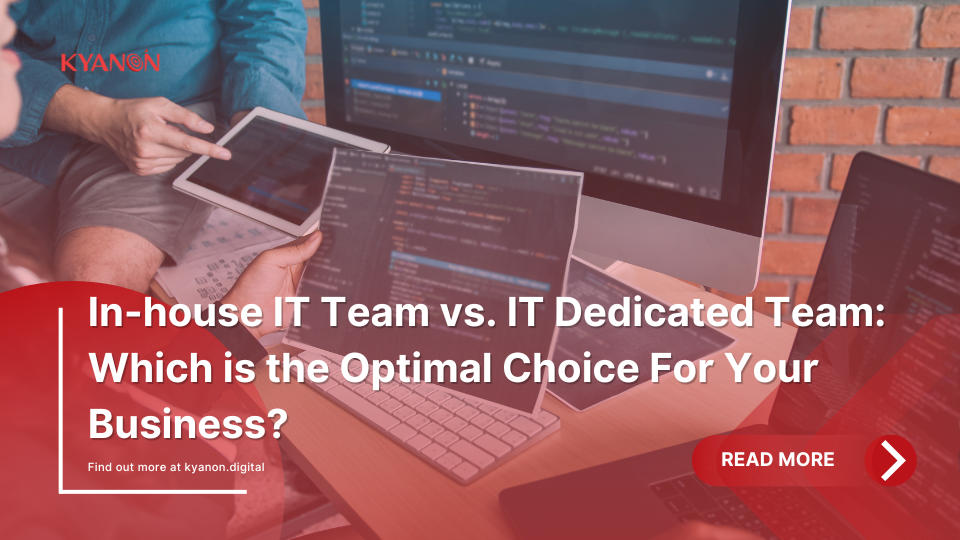In today’s era of rapidly advancing technology, businesses face a crucial decision: choosing between an in-house IT department and an IT dedicated team. Each model not only affects costs but also profoundly impacts operational efficiency and the ability to respond quickly to market changes.
This article will provide a detailed analysis of these two models, aiding businesses in making informed decisions to optimize resources, save costs, and assert competitive positions in the digital age.

1. What is an In-house IT Team?
An In-house IT team consists of employees who work directly for the company and are responsible for managing, maintaining, and supporting the information technology (IT) infrastructure. This team works exclusively for the company, handling tasks ranging from hardware and software management to security and troubleshooting, ensuring smooth operation of technology systems.

For one, having an In-house IT team offers several advantages to businesses. The staff can immediately address issues, minimizing disruptions to work while enhancing security for critical data. Additionally, the In-house team can engage in long-term planning, ensuring the technology system evolves alongside the company’s growth.
On the other hand, owning an In-house IT team also poses numerous challenges for its owners.
1.1. Advantages of Using an In-house IT Team
An in-house IT team offers businesses the benefit of dedicated, on-site support tailored to their unique needs. With direct control over operations, seamless communication, and a deep understanding of company systems, an in-house team can provide quick solutions and foster innovation. Let’s explore the key advantages of building an internal IT team.
- Easy Management and Adjustment: Owning an In-house IT team means the company has complete control over all personnel activities. This allows easy management and adjustment of IT operations to align with business goals.
- Quick Response and Effective On-site Support: With an in-house team, technical issues can be resolved immediately, avoiding delays caused by reliance on external vendors.
- Deep Understanding of the Business and Cultural Fit: Team members are not only familiar with the company’s systems and processes but also understand each department’s particular challenges and needs. Over time, they accumulate extensive knowledge about workflows, enabling tailored and effective IT solutions. Furthermore, working in the same corporate culture helps them integrate easily and collaborate closely with other departments.
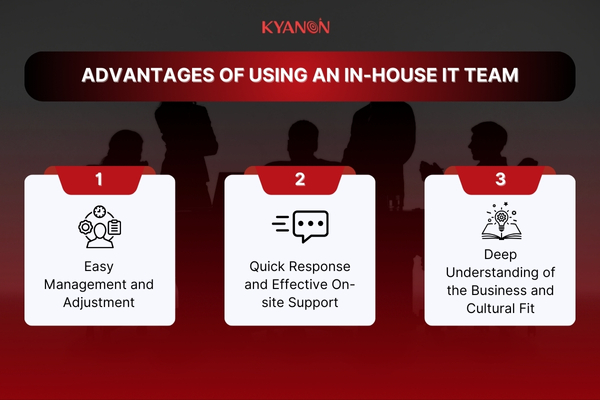
1.2. Challenges in Building an In-house IT Team
While an in-house IT team can offer numerous benefits, it also comes with its share of challenges. From high recruitment costs to the complexities of retaining skilled talent, managing an internal team can demand significant resources. Let’s examine the key obstacles businesses may face when building an in-house IT team.
- High Costs: Companies must pay fixed employee salaries and benefits such as health insurance, paid leave, and training costs. Other expenses like office supplies, equipment, and infrastructure can also create financial burdens for the company.
- Limited Expertise: Employees may sometimes need more skills to handle complex or rapidly evolving technologies. This can cause an inability to meet new technological demands promptly, affecting work performance and business growth.
- Difficulties in Scaling: The process of recruiting, training, and integrating new employees into the company’s culture is not only time-consuming but also costly. Therefore, businesses may need help to meet scaling demands when market conditions change quickly.
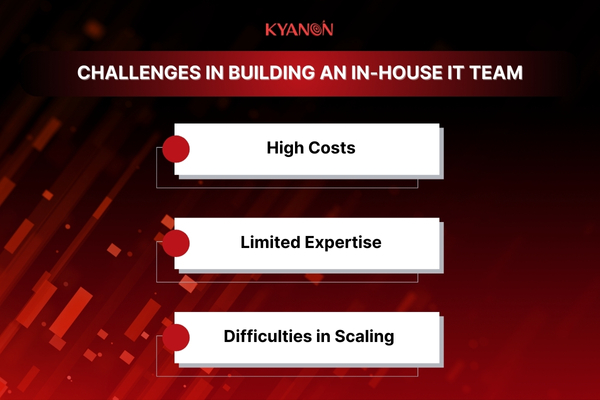
2. What is an IT Dedicated Team?
An IT dedicated team consists of external IT specialists hired to manage IT related tasks for the company. They operate independently of the company, often working remotely or through a managed service provider (MSP). The IT Dedicated team is responsible for various IT tasks and provides expertise that may not be available internally.
IT Dedicated teams are typically built based on the specific needs of each business. Their personnel are diverse, including experts in various fields such as systems management, cybersecurity, software development, and cloud services. This flexibility allows businesses to adjust the number of personnel needed based on different stages of development or projects.

IT Dedicated teams offer a wide range of services depending on the business’s needs. Common services include systems management, ensuring stable operation of servers and networks, cybersecurity, cloud services, or participating in custom software development and providing technical support.
Like an In-house IT team, opting for an IT-dedicated team brings numerous advantages. However, alongside these benefits, businesses also face various challenges.
2.1. Benefits of an IT Dedicated Team
Partnering with an IT dedicated team provides businesses with access to specialized expertise, scalability, and cost-effectiveness. This approach allows companies to focus on core operations while leveraging the skills of external professionals. Let’s uncover the key benefits of choosing an IT dedicated team for your business.
- Cost Savings: With the flexible operation of an IT-dedicated team, such as on-demand services or contracts, businesses can allocate resources more efficiently and only pay for the services they actually use.
- Access to High-Skilled Talent: IT-dedicated teams possess specialized skills and advanced technologies that internal staff may lack. This allows businesses to leverage cutting-edge solutions and best practices without facing the difficulties of recruiting and training.
- Easy Scaling: One of the significant advantages of an IT-dedicated team is its ability to adapt flexibly to the growth of the business or changes in technology needs. Businesses can quickly and effectively scale services up or down.
- 24/7 Support: Many IT-dedicated teams offer continuous support, which is particularly beneficial for global businesses.
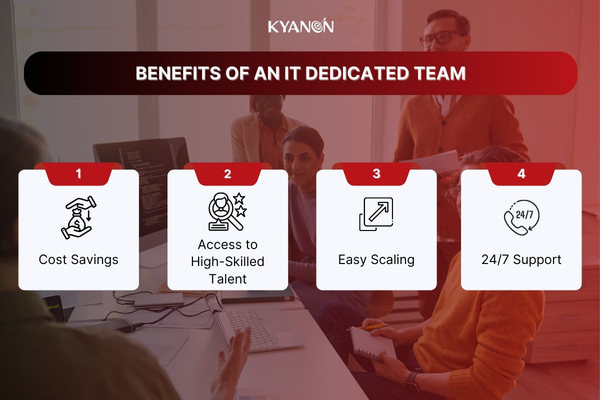
2.2. Challenges of Hiring an IT Dedicated Team
While an IT dedicated team offers numerous advantages, it also comes with potential challenges. From communication barriers to aligning with business objectives, outsourcing IT services requires careful consideration. Let’s explore the key challenges businesses may encounter when hiring an IT dedicated team.
- Management Challenges: Reliance on external providers can make it difficult for businesses to control daily work processes. This can lead to challenges in ensuring that the company’s standards and procedures are followed as desired.
- Communication Barriers: Differences in time zones or ineffective communication between external teams can lead to misunderstandings and delays in project implementation.
- Security Concerns: When collaborating with IT-dedicated teams, handling sensitive company data is one of the biggest security concerns. If not managed correctly, sharing information can create security risks, potentially leading to data leaks or breaches.
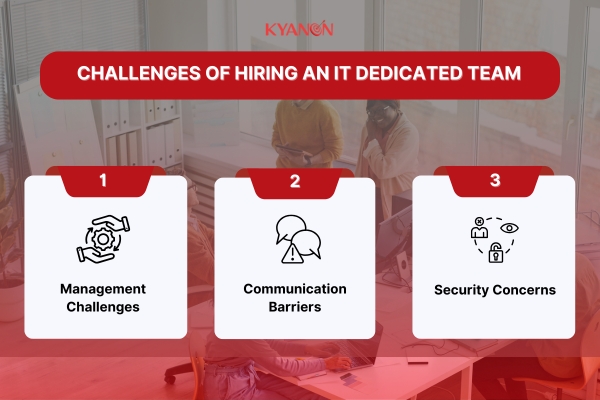
3. What are the differences between in-house IT teams and dedicated IT teams?
Criteria | In-house IT Team | IT Dedicated Team |
| Recruitment and Staffing | – Follows the company’s general process, including job description, recruitment, screening, and interviews. – Permanent employees of the company. | – Staff is usually selected through competency-based interviews. – IT contractors may sign short-term contracts for large projects. |
| Costs | Businesses must endure long-term costs, including salaries and benefits, training fees, and infrastructure. | – Flexible costs based on contracts or fixed fees. – Additional investment in security solutions may be required when working with external teams. |
| Management | – Full control of team and workflows. – Easy to monitor, manage directly, and adjust as needed. | – Indirect control primarily through contracts and KPIs. – Project monitoring via reports and communication with external teams. |
| Scalability | – Limited by internal resources, difficult to scale. | – Easily scalable, with quick adjustments in service levels. |
4. Which Types of Companies Should Choose an In-house IT Team?
Choosing an in-house IT team is often the best fit for companies with specific needs and a long-term commitment to technology development. Businesses that require direct control, customized solutions, and close collaboration may benefit most from this approach. Let’s identify the types of companies that are well-suited for an in-house IT team.
- Large enterprises: Large companies often have complex operations and require comprehensive IT management. An In-house IT team can ensure continuous and efficient operation of IT systems while securing information and providing rapid technical support to employees.
- Tech companies: Companies in the technology, software, or application development sectors often need an In-house IT team to quickly meet development and product maintenance demands.
- High-security businesses: Finance, healthcare, and government businesses typically have stringent information security requirements. An In-house IT team can manage cybersecurity and security processes more effectively, protecting sensitive data and ensuring legal compliance.
- Companies needing continuous customer support: An In-house IT team can provide 24/7 support services, ensuring customers receive timely assistance.
5. When should businesses hire an IT-dedicated team?
An IT-dedicated team is ideal for businesses seeking flexibility, specialized expertise, and cost-efficient solutions for their projects. This model works well for companies with short-term demands or rapidly changing needs. Let’s explore the scenarios where hiring an IT-dedicated team makes the most sense.
- Small and Medium Enterprises (SMEs): SMEs often lack the resources to maintain a full in-house IT team. Opting for IT-dedicated teams helps them save costs by paying only for the services they need without investing in personnel, training, and infrastructure.
- Startups: Hiring an IT-dedicated team allows start-up companies to access high-skilled experts without managing an internal team, saving time and resources.
- Global businesses: Companies operating globally often require 24/7 IT support to meet customer needs across different time zones. An IT-dedicated team can provide continuous support and promptly address technical issues.
- Short-term technology projects: Companies with short-term technology projects should hire an IT team dedicated to completing projects without the need for long-term investments in personnel.
6. Hybrid Model: Combining the Advantages of Both Models
The hybrid IT model combines in-house teams and dedicated IT teams, providing businesses with flexibility and optimization in both costs and expertise.
In-house IT teams handle daily tasks like system maintenance and technical support. With a deep understanding of the company’s culture and processes, they ensure continuous operation of systems aligned with business goals. Meanwhile, IT-dedicated teams are utilized for projects requiring expertise like information security or new technology implementation. These specialists provide advanced solutions without necessitating long-term investment in recruitment and training. Once a project is completed, the external team can hand over management to the In-house team.
The hybrid model optimizes costs by only paying for external services when needed, avoiding waste of resources on long-term personnel. At the same time, businesses maintain a high level of control through their In-house teams, while external teams provide flexibility in scaling. This way, companies can access deep expertise and advanced technologies without long-term commitments, enhancing operational efficiency.
Ultimately, every business has its unique characteristics. The choice between an IT dedicated team or an In-house team should be based on the specific strategic goals of the business. Careful consideration is essential to ensure that your choice best supports sustainable development goals for the future.
If you need advice or have questions, Kyanon Digital offers consulting services and professional IT team development, helping your business optimize operations and enhance efficiency. Contact us today for consultation and to learn more about customized IT solutions based on your needs.
